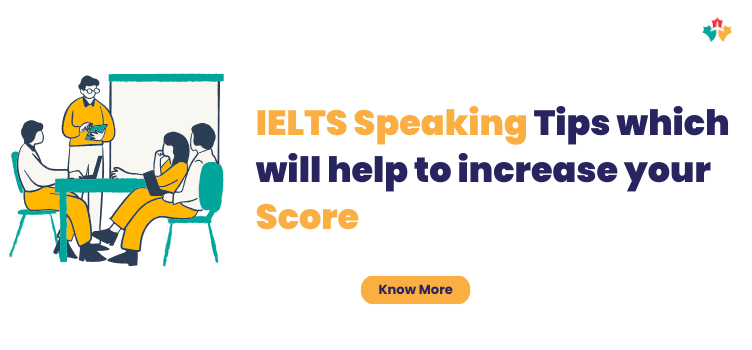Our Blogs
IELTS Speaking Tips which will help to increase your Score

10 IELTS Speaking Tips which will help you to increase your Score
The IELTS Speaking part is one of four parts of the IELTS test. Unlike the other parts, you can do it separately, up to a week before or after the rest. It involves talking about various topics, answering questions, and giving your opinions. Here are some common topics, what the questions are like, and some tips for doing well.
The IELTS Speaking test is divided into three parts (totaling 11 to 14 minutes)
Introduction and Interview (4 to 5 minutes)
Here, the examiner asks you questions about yourself, your family, your home, hobbies, studies, and interests. If they want more details, they may ask “why?” or “why not?” questions.
Long Turn (3 to 4 minutes, including prep time)
You’ll receive a task card with a specific topic to discuss. You’ll have one minute to prepare your thoughts (you can also take notes) and then up to two minutes to speak about the topic. Afterward, the examiner may ask one or two follow-up questions. Topics are usually general and may involve telling a story about yourself or a past experience.
Discussion (4 to 5 minutes)
The examiner will ask you more questions related to the topic from Long Turn. Here, you have the opportunity to delve deeper into your ideas, express opinions, and introduce more abstract concepts into the conversation.
Given its interview-like structure, the Speaking test can be stressful. However, there are strategies you can use to minimize stress and achieve a high score.
Follow the 10 IELTS Speaking tips provided and be well-prepared to succeed
-
Choose a Suitable Study Partner
Practice for the IELTS Speaking test with someone who speaks English better than you to improve but avoid pairing with someone much more advanced to prevent discouragement and doubts about your skills.
-
Talk More Than the Examiner
Think of the IELTS Speaking test like an interview rather than a conversation. The examiner asks questions, but you should do most of the talking.
-
Explain More!
When answering a question, don’t just give a short answer. Expand on it by using different kinds of sentences. You can use:
- If or unless sentences: Like, “If we leave late, we’ll miss the bus.”
- Time sentences: For example, “I’ll go to college when I finish school.”
- Words like can or might: Such as, “You can borrow my book.
- When talking about what others said, use reported speech, like “She said she enjoys reading.
It’s okay to use more complex sentences and make some mistakes rather than only using simple ones.

-
Sharing Stories: Making IELTS speaking responses engaging through narrative techniques.
When faced with IELTS speaking questions like “What sport do you like to play?” and lacking relevant experience, transform your responses into engaging narratives. You’re not bound to strict truthfulness, so get creative or delve into why you’re not into sports, potentially revealing captivating anecdotes.
-
It’s About How You Talk, Not What You Know:
Though you won’t know the exact IELTS speaking topics beforehand, your expertise in any given subject matters less than your ability to respond effectively. Examiners value your resourcefulness and adaptability, focusing more on your response quality than factual knowledge.
-
Stretch Yourself (But Understand the Risks)
While understanding and employing complex language is vital for a high score, ensure you comprehend the words you use, as the examiner might inquire further. Push your linguistic boundaries while remaining clear and articulate.
-
Organize Your Ideas
Just like in a job interview, taking a moment to gather your ideas before responding can prevent aimless rambling. Politely ask for a moment to contemplate if needed, maintaining a composed demeanour and avoiding excessive use of this tactic.
-
Adding Emotion to the Mix
Injecting emotion into your responses, though not to the point of melodrama, enhances engagement and showcases your fluency. Mimic the tone and expression you would use in your native language, drawing inspiration from English media for varied vocal inflections.
-
Project Confidence
Despite pre-test jitters being common, exude confidence through your demeanour and interactions with the examiner. A polished appearance, punctuality, and a warm greeting contribute to a favourable impression, with minor slip-ups forgiven in light of nerves.
-
Maintain a Balanced Pace
While fluency often correlates with speaking speed, avoid extremes during the IELTS Speaking test. Rapid speech risks incomprehensibility, while a sluggish pace may lead to disinterest. Strive for a steady tempo to ensure clarity and engagement.
Get in touch with SPS Canada
Receive professional advice on any of your questions regarding Canadian immigration. get in touch with us, experienced immigration consultants from SPS Canada. For additional information, contact support@spscanada.com (Canada) or support.amd@spscanada.com (Ahmedabad), or by phone at (1) 905-362-9393 (Canada) or +919586226232 (Ahmedabad).
Comments
Our Clients
We're Trusted Globally
We are a regulated immigration practicing firm, providing advice and
solutions on matters related to Canadian immigration.














